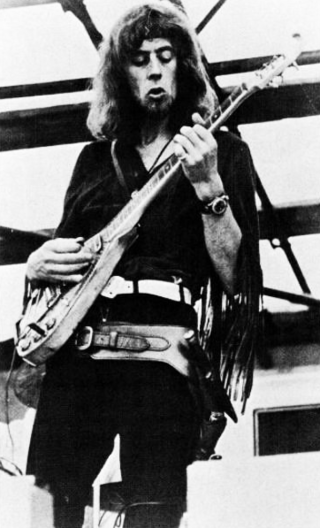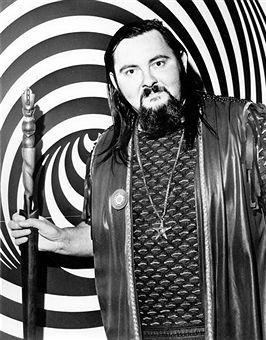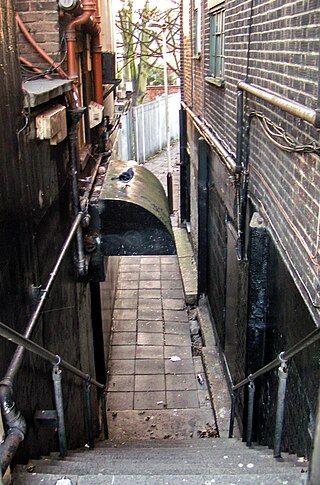
John Mayall & the Bluesbreakers were an English blues rock band led by multi-instrumentalist, singer and songwriter John Mayall. The band has been influential as an incubator for British rock and blues musicians. Many of the best known bands to come out of Britain in the 1960s and 1970s had members that came through the Bluesbreakers at one time, forming the foundation of British blues music that is still played heavily on classic rock radio. Among those with a tenure in the Bluesbreakers are guitarists Eric Clapton, Peter Green and Mick Taylor, bassists John McVie, Jack Bruce and Tony Reeves, drummers Hughie Flint, Aynsley Dunbar, Mick Fleetwood and Jon Hiseman, and numerous others.

John Brumwell Mayall was an English blues and rock musician, songwriter and producer. In the 1960s, he formed John Mayall & the Bluesbreakers, a band that has counted among its members some of the most famous blues and blues rock musicians. A singer, guitarist, harmonica player, and keyboardist, he had a career that spanned nearly seven decades, remaining an active musician until his death aged 90. Mayall has often been referred to as the "godfather of the British blues", and was inducted into the Rock and Roll Hall of Fame in the musical influence category in 2024.
British blues is a form of music derived from American blues that originated in the late 1950s, and reached its height of mainstream popularity in the 1960s. In Britain, blues developed a distinctive and influential style dominated by electric guitar, and made international stars of several proponents of the genre, including the Rolling Stones, the Animals, the Yardbirds, John Mayall, Eric Clapton, Fleetwood Mac and Led Zeppelin.

John Symon Asher Bruce was a Scottish musician. He gained popularity as the primary lead vocalist and bassist of rock band Cream. After the group disbanded in 1968, he pursued a solo career and also played with several bands.

Raymond "Boz" Burrell was an English musician. Originally a vocalist and guitarist, Burrell is best known for being the vocalist and bassist of King Crimson from 1971 to 1972 and the original bassist of Bad Company, formed in 1973, with whom he stayed until 1982 before re-joining for a reunion of the original line-up during 1998 to 1999. He died of a heart attack in Spain in 2006, aged 60.

Cyril Davies was an English blues musician, and one of the first blues harmonica players in England.

Richard Malden Heckstall-Smith was an English jazz and blues saxophonist. He played with some of the most influential English blues rock and jazz fusion bands of the 1960s and 1970s. He is known for primarily playing tenor, soprano, and baritone saxophones, as well as piano, clarinet and alto saxophone.

Aynsley Thomas Dunbar is an English drummer. He has worked with John Mayall, Frank Zappa, Jeff Beck, Journey, Jefferson Starship, Nils Lofgren, Eric Burdon, Shuggie Otis, Ian Hunter, Lou Reed, David Bowie, Mick Ronson, Whitesnake, Pat Travers, Sammy Hagar, Michael Schenker, UFO, Michael Chapman, Jake E. Lee, Leslie West, Kathi McDonald, Keith Emerson, Mike Onesko, Herbie Mann and Flo & Eddie. Dunbar was inducted into the Rock and Roll Hall of Fame as a member of Journey in 2017.

Graham John Clifton Bond was an English rock/blues musician and vocalist, considered a founding father of the English rhythm and blues boom of the 1960s.

CCS, sometimes written as C.C.S., was a British musical group, led by blues guitarist Alexis Korner. The name was derived as an abbreviation of Collective Consciousness Society.

George Bruno "Zoot" Money was an English vocalist, keyboardist and bandleader. He was best known for playing the Hammond organ and for his leadership of the Big Roll Band. Inspired by Jerry Lee Lewis and Ray Charles, Money was drawn to rock and roll music and became involved in the music scenes of Bournemouth and Soho during the 1960s. He took his stage name "Zoot" from Zoot Sims after seeing him perform in concert.

Anthony "Duster" Bennett was a British blues singer and musician. Based in London, his first album Smiling Like I'm Happy saw him playing as a one-man band, playing a bass drum with his foot and blowing a harmonica on a rack while strumming a 1952 Les Paul Goldtop guitar given to him in 1968 by Peter Green. Backed by his girlfriend Stella Sutton and the original Fleetwood Mac on three tracks, the album was well received. He remained popular on the local blues club scene until his death in a car crash in 1976.

Ealing Jazz Club was a music venue in Ealing, west London, England, which opened in 1959. It became London's first regular blues venue, with performances by the Alexis Korner and Cyril Davies band Blues Incorporated. Now commonly referred to as the Ealing Blues Club, the venue is now a nightclub called The Red Room.

Colin Hodgkinson is a British rock, jazz and blues bassist, who has been active since the 1960s.
Alexis Korner's Blues Incorporated, or simply Blues Incorporated, were an English blues band formed in London in 1961, led by Alexis Korner and including at various times Jack Bruce, Charlie Watts, Terry Cox, Ginger Baker, Art Wood, Long John Baldry, Ronnie Jones, Danny Thompson, Graham Bond, Cyril Davies and Dick Heckstall-Smith.

Duffy Power was an English blues and rock and roll singer, who achieved some success in the 1960s and continued to perform and record intermittently later.

Peter Eiberg Thorup was a Danish guitarist, singer, composer and record producer. He was one of the most important blues musicians in Denmark, and he was known outside his own country, when in the late 1960s he met Alexis Korner and the two formed the bands New Church, The Beefeaters, CCS, and later Snape.

C.C.S. was the second studio album of the British blues and jazz outfit CCS, led by guitarist Alexis Korner. This album is usually called C.C.S. 2 to avoid confusion with the first, eponymous album, even though that title cannot be found anywhere on the record or sleeve.
British rhythm and blues was a musical movement that developed in the United Kingdom between the late 1950s and the early 1960s, and reached a peak in the mid-1960s. It overlapped with, but was distinct from, the broader British beat and more purist British blues scenes, attempting to emulate the music of American blues and rock and roll pioneers, such as Muddy Waters and Howlin' Wolf, Chuck Berry and Bo Diddley. It often placed greater emphasis on guitars and was often played with greater energy.
Geoffrey Frank Bradford was an English guitarist who played alongside British blues musicians in the 1950s and 1960s, such as Long John Baldry and Alexis Korner.


















